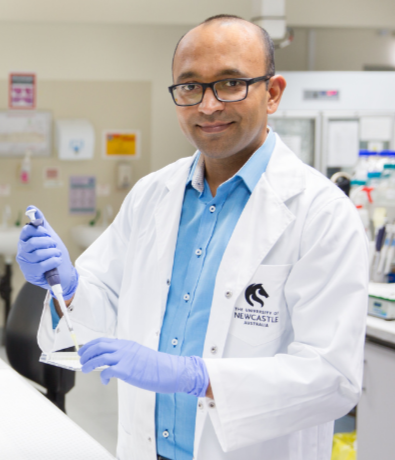Written by Michelle Fincke
Medical research is a little like scaffolding on a building project – a solid base and secure footholds mean you can put your trust in the next step. The only way is up.

Professor Pradeep Tanwar’s investigation of ovarian cancer is a perfect example, with one promising research project supported by the OCRF leading directly to a second, both with the potential to save lives.
In 2019, Professor Tanwar and a University of Newcastle team were awarded a $566,000 grant to explore the part hormones play in the origin and subsequent spread of the disease.
For that project, the team was able to access precious tissue samples from patients with a family history of ovarian cancer, specifically the BRCA1/2 gene. The samples yielded detail about hormones but also a new development: a novel blood biomarker for ovarian cancer, a protein produced by cells when they first begin to change.
With ovarian cancer highly treatable if found at the earliest stages, the biomarker is creating hope and the OCRF is again investing in Professor Tanwar’s work, with a 2021 grant for $595,000 to validate the research results. The team will test 1,000 women with invasive or borderline ovarian cancer and 1,000 who don’t have cancer, measuring the new biomarker’s effectiveness at detecting ovarian cancer against the only other currently available biomarker.
Professor Tanwar began his career as a vet, focused on clinical work rather than research. But he wanted to do more than just manage symptoms – he wanted to solve tough medical problems and create better outcomes for patients. Redirecting his career he undertook a PhD in gynaecology and turned his attention to the challenge of ovarian cancer.

If we can go to the moon and make tunnels through the sea, why can’t we do something here?” he says. “What’s needed is investment and focused energy.”
Professor Tanwar is especially grateful for the OCRF’s funding for the 2019 research, still underway, which he describes as “blue-collar sort of work, the hard yards” of examining the role of hormones – from pregnancy, the contraceptive pill, breastfeeding and lifestyle choices – in preventing ovarian cancer. With oral contraceptives offering protection from the disease, he sees the possibility of creating a pill that mimics their cancer-curbing properties.
And as his research team begins testing the potential of their new biomarker, his sights are firmly set on translating the discovery into lives saved. He hopes it will contribute to a ‘triage tool’ for GPs, a more specific indicator to help them determine which of the vague and often confounding symptoms might indicate ovarian cancer and need immediate investigation. He knows many patients who have “bounced around” the healthcare system awaiting a diagnosis: tragically, it typically comes too late.
“Spending time with people who have this sudden deadline – life ending in a year or two – changes your way of thinking. You want to take action and funding from the OCRF helps us do this,” he says.
provide sustainable funding
Researchers like Pradeep need ongoing funding to ensure their research can continue uninterrupted. By making a monthly donation to The Lab, you can provide sustainable funding and ensure researchers can stay in the lab, working toward better outcomes for ovarian cancer.
Join The Lab